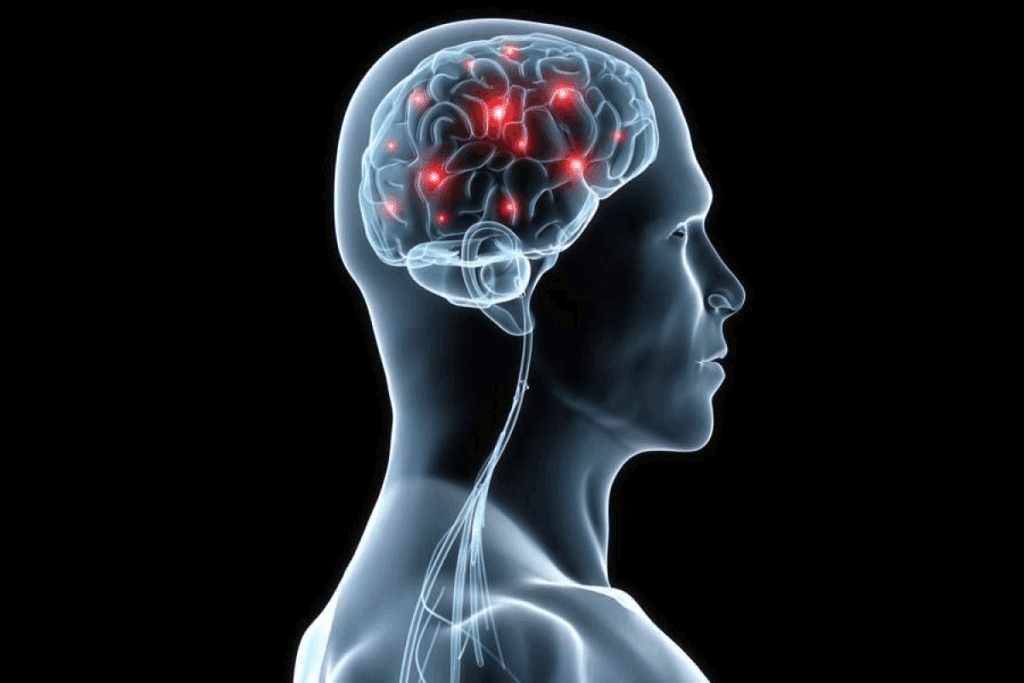
An underactive thyroid gland, or hypothyroidism, can greatly affect mental health. Find out does underactive thyroid cause anxiety and how it affects your mood and mental health.
The thyroid gland is key in controlling brain chemistry and mood. If it doesn’t make enough hormones, you might feel anxious or have mood swings. Knowing how thyroid disease affects mental health is key to treating it well.
Key Takeaways
- Hypothyroidism can significantly impact mental health.
- The thyroid gland regulates brain chemistry and mood.
- Insufficient thyroid hormone production can lead to anxiety and mood swings.
- Understanding the link between thyroid disease and mental health is essential for effective treatment.
- Liv Hospital’s expert multidisciplinary approach helps patients achieve lasting well-being.
The Thyroid-Brain Connection

Thyroid hormones greatly affect our brain’s mood, thinking, and feelings. The thyroid gland makes hormones that control our metabolism and energy. These hormones are key for a healthy brain.
How Thyroid Hormones Affect Brain Function
Thyroid hormones, like T3 and T4, are vital for brain health. They help neurons grow and work well. Not having enough thyroid hormones can cause brain problems, like memory loss and mood swings.
Thyroid hormones also play a big role in our mental health. They affect areas of the brain that control our mood and thoughts. This shows how thyroid hormones directly impact our brain’s emotional and thinking centers.
Neurotransmitters and Mood Regulation
Neurotransmitters like serotonin, dopamine, and norepinephrine are key for our mood. Thyroid hormones help make and control these chemicals. For example, not enough thyroid hormones can lower serotonin levels, which can cause depression and anxiety.
The link between thyroid hormones and neurotransmitters is complex. Thyroid hormones affect how neurotransmitters work, and neurotransmitters can change thyroid function. This balance is important for our mental health.
| Neurotransmitter | Function | Impact of Thyroid Hormones |
| Serotonin | Regulates mood, appetite, and sleep | Thyroid hormone deficiency can decrease serotonin levels |
| Dopamine | Involved in reward, motivation, and pleasure | Thyroid hormones influence dopamine synthesis and activity |
| Norepinephrine | Plays a role in attention and stress response | Thyroid hormone imbalance can affect norepinephrine levels |
It’s important to understand how the thyroid and brain are connected. This knowledge helps doctors treat mental health problems linked to thyroid issues. By knowing how thyroid hormones affect our brain and mood, doctors can create better treatment plans.
Understanding Hypothyroidism and Its Prevalence

Hypothyroidism is a condition where the thyroid gland doesn’t make enough thyroid hormones. These hormones are key for metabolism, energy, and health. It affects both physical and mental health.
What Is an Underactive Thyroid?
An underactive thyroid, or hypothyroidism, happens when the thyroid gland can’t make enough thyroid hormones. These hormones, like thyroxine (T4) and triiodothyronine (T3), control metabolism and growth.
Symptoms of hypothyroidism can vary and affect many areas of health. They include fatigue, weight gain, feeling cold, and dry skin. Mental health can also suffer, with symptoms like depression, anxiety, and mood swings.
Prevalence in the United States
In the U.S., hypothyroidism is common, affecting over 20 million people. It’s one of the most common thyroid disorders.
“Thyroid disorders are among the most common endocrine disorders in the United States, with hypothyroidism being a leading condition.”
Hypothyroidism is more common with age and affects women more than men. Knowing this helps raise awareness and ensure proper treatment.
Risk Factors and Common Causes
Several factors can lead to hypothyroidism. These include:
- Autoimmune thyroiditis (Hashimoto’s thyroiditis)
- Thyroid surgery
- Radioactive iodine treatment
- Radiation therapy to the head and neck
- Certain medications
- Iodine deficiency
- Congenital hypothyroidism
| Risk Factor | Description |
| Autoimmune thyroiditis | An autoimmune condition where the body produces antibodies against the thyroid gland, leading to inflammation and reduced thyroid function. |
| Thyroid surgery | Surgical removal of part or all of the thyroid gland can lead to hypothyroidism if the remaining thyroid tissue is insufficient to produce necessary hormones. |
| Iodine deficiency | Lack of sufficient iodine, a critical component for thyroid hormone production, can cause hypothyroidism. |
Knowing these risk factors and causes helps in early detection and management of hypothyroidism. This can lessen its impact on mental and physical health.
Does Underactive Thyroid Cause Anxiety? The Scientific Evidence
Research shows that an underactive thyroid might lead to morning anxiety. Many studies have looked into how thyroid health affects our minds.
Research Findings on Hypothyroidism and Anxiety
People with hypothyroidism often face anxiety disorders. They are more likely to have anxiety than others. Morning anxiety is common in some with hypothyroidism.
Biological Mechanisms Explaining the Connection
Thyroid hormones control important mood chemicals like serotonin and dopamine. An imbalance can cause anxiety. Hypothyroidism can also harm brain function and structure, leading to anxiety.
Clinical Studies and Their Conclusions
Studies show treating hypothyroidism can reduce anxiety. Thyroid hormone replacement and other treatments help manage anxiety. A detailed review of studies emphasizes the need to treat hypothyroidism for mental health.
The scientific evidence confirms a link between hypothyroidism and anxiety. It’s key to understand this to find better treatments.
Common Mental Health Symptoms of Hypothyroidism
Hypothyroidism can cause many mental health symptoms. These symptoms can make life harder and are often hard to diagnose and treat.
Brain Fog and Cognitive Impairment
Brain fog is a common symptom. It makes it hard to focus, remember things, and feel mentally clear. This can really affect how well you can do daily tasks.
- Difficulty concentrating on tasks
- Memory problems
- Decreased mental clarity
Depression and Low Mood
Depression is common in people with hypothyroidism. They might feel sad, hopeless, and not enjoy things they used to. Depression can be caused by the hormonal imbalance or the long-term nature of the condition.
- Persistent sadness
- Loss of interest in activities
- Changes in appetite or sleep
Anxiety and Panic Attacks
Hypothyroidism can also cause anxiety and panic attacks. The hormonal imbalance can mess with neurotransmitters, leading to more anxiety. Sometimes, this anxiety can be so bad it causes panic attacks.
Sleep Disturbances
Sleep problems are common in hypothyroidism. They can make mental health worse. Issues like sleep apnea and insomnia can make it hard to sleep well.
- Difficulty falling asleep
- Frequent awakenings during the night
- Excessive daytime sleepiness
In conclusion, hypothyroidism can cause many mental health issues. These include brain fog, depression, anxiety, and sleep problems. It’s important to recognize these symptoms to manage and treat the condition effectively.
Thyroid Anxiety in the Morning: A Distinctive Pattern
Morning anxiety is a big deal for some people with thyroid problems. It’s not just a quick feeling. It can really mess up your day. For those with hypothyroidism, mornings can feel extra anxious.
Why Morning Anxiety Occurs with Thyroid Dysfunction
Studies show hypothyroidism can cause anxiety, mostly in the morning. There are a few reasons for this:
- Cortisol levels usually go up in the morning. But for people with thyroid issues, this natural rise can be off. This might make them feel more anxious.
- Thyroid hormones help control mood by regulating serotonin and dopamine. If these hormones are out of balance, it can lead to morning anxiety.
- Thyroid hormones also affect how fast your body burns energy. This can impact how you feel in the morning, making anxiety worse.
Distinguishing Thyroid-Related Morning Anxiety from Other Types
It’s key to tell thyroid-related morning anxiety apart from other kinds. Here’s how:
- The timing and pattern of the anxiety. Thyroid-related anxiety often follows the thyroid hormone cycle.
- Other symptoms like tiredness, weight changes, or dry skin. These can hint at thyroid issues.
- How well thyroid treatment works. If morning anxiety gets better with thyroid meds, it’s likely thyroid-related.
Thyroid experts say it’s vital to understand morning anxiety’s causes. This is why a detailed approach to diagnosing and treating thyroid-related anxiety is so important.
Physical Symptoms That Accompany Mental Health Changes
Hypothyroidism often shows up with physical symptoms that affect mental health. These symptoms can make mental health problems worse or even start them. This shows how important the thyroid gland is for our overall health.
Fatigue and Energy Levels
Fatigue is a common symptom of hypothyroidism. It makes it hard to do everyday things and can lower your mood. Feeling tired all the time can make you feel frustrated and unhappy.
Here’s how fatigue can change your day:
| Activity | Normal Energy Level | Energy Level with Hypothyroidism |
| Morning Exercise | High | Low |
| Work Productivity | High | Low to Moderate |
| Social Engagement | Moderate to High | Low |
Thyroid Loss of Appetite and Weight Changes
Hypothyroidism can also change how much you eat and your weight. Some people might not feel hungry, while others might gain weight. These changes can affect how you feel about your body and yourself.
The link between thyroid function, appetite, and weight is complex. Several factors can cause weight changes in hypothyroidism:
- Metabolic rate changes
- Fluid retention
- Changes in appetite
Temperature Sensitivity and Its Psychological Impact
People with hypothyroidism often feel cold, even when it’s not that chilly. This can make them feel irritable or uncomfortable. These feelings can hurt their mental health.
It’s important to understand how physical symptoms and mental health are connected. Treating both can help people with hypothyroidism feel better overall.
Comparing Mental Symptoms: Hypothyroidism vs. Hyperthyroidism
Both hypothyroidism and hyperthyroidism can affect your mental health. But, their symptoms are different. Knowing these differences helps doctors diagnose and treat you better.
Mental Symptoms of Hyperthyroidism
Hyperthyroidism means your thyroid makes too many hormones. This can cause anxiety, panic attacks, and irritability. It makes your body work too fast, leading to nervous system issues.
Key mental health symptoms of hyperthyroidism:
- Anxiety and panic attacks
- Irritability and mood swings
- Restlessness and hyperactivity
- Difficulty concentrating
Hyperthyroidism and Irritability
Irritability is common in hyperthyroidism. People might get annoyed easily, without a clear reason. This can hurt relationships and make mental health issues worse.
“The irritability associated with hyperthyroidism can be quite debilitating, affecting not just the individual but also those around them.”
Hypothyroidism Mood Swings vs. Hyperthyroidism Mood Patterns
Mood swings happen in both hypothyroidism and hyperthyroidism. But, they show up differently. Hypothyroidism often brings depression and tiredness. Hyperthyroidism leads to anxiety, irritability, and being too active.
| Symptom | Hypothyroidism | Hyperthyroidism |
| Mood Swings | Depression, lethargy | Anxiety, irritability |
| Energy Levels | Fatigue, low energy | Hyperactivity, restlessness |
| Emotional State | Sadness, apathy | Anxiety, agitation |
It’s key for doctors to know these differences. This helps them give the right treatment for your mental health issues.
Thyroid Disease and Mental Health: The Bidirectional Relationship
Research shows a strong link between thyroid problems and mental health issues. This connection means we need to treat both thyroid health and mental well-being together.
How Mental Health Conditions Affect Thyroid Function
Depression and anxiety can harm thyroid function. Studies show people with mental health issues are more likely to have thyroid problems. This suggests a strong connection between the two.
“The relationship betweenthyroid function and mental health is complex, with each affecting the other.”
Dr. Mary V. (2022)
Stress and anxiety can start autoimmune reactions, which might lead to thyroid autoimmunity. This shows why managing stress is key in treating thyroid issues.
Stress, Anxiety, and Thyroid Autoimmunity
Stress and anxiety can weaken the immune system, making autoimmune thyroid diseases worse. The connection between stress, anxiety, and thyroid autoimmunity is vital to study. It helps us find better ways to treat and manage these conditions.
| Factor | Impact on Thyroid | Impact on Mental Health |
| Stress | May trigger or worsen autoimmune thyroiditis | Can make anxiety and depression worse |
| Anxiety | Potential link to thyroid dysfunction | Directly adds to mental health problems |
The Vicious Cycle Between Thyroid Dysfunction and Mental Health
Thyroid problems and mental health issues go hand in hand. Thyroid disorders can lead to mental health issues, which can then affect thyroid function. This creates a cycle that’s hard to break without full care.
It’s important to understand this relationship to create effective treatments. By seeing how these factors interact, doctors can provide better care. This improves health outcomes for patients.
Diagnosis Challenges: When Thyroid Issues Masquerade as Mental Health Disorders
Thyroid problems and mental health issues share similar symptoms, making diagnosis hard. Hypothyroidism can show symptoms that look like anxiety disorders. It’s important for doctors to check thyroid function when they see these symptoms.
Common Misdiagnoses
Thyroid problems are often seen as mental health issues because of similar symptoms. Symptoms like tiredness, weight gain, and feeling down are common in hypothyroidism. They can be mistaken for mental health problems. Getting the right diagnosis needs a full check-up that includes thyroid tests.
- Depression misdiagnosed as hypothyroidism
- Anxiety disorders attributed to primary mental health issues
- Mood swings mistakenly diagnosed as bipolar disorder
The Importance of Thyroid Testing
Testing the thyroid is key to telling if mental health symptoms come from thyroid issues or not. Doctors check TSH, free T4, and free T3 levels. They also look for thyroid antibodies to see if there’s an autoimmune problem. A detailed thyroid check can stop wrong diagnoses and help find the right treatment.
- TSH (Thyroid-Stimulating Hormone) test
- Free T4 and Free T3 tests
- Thyroid antibody tests (e.g., TPOAb, TgAb)
Red Flags That Suggest Thyroid Involvement in Mental Health Symptoms
Some signs can show that thyroid problems are linked to mental health symptoms. These include sudden weight changes, feeling cold, dry skin, and hair loss. Spotting these signs can lead to a thyroid check and might find a hidden thyroid issue.
Key Red Flags:
- Unexplained weight gain or loss
- Cold intolerance
- Dry skin and hair loss
- Fatigue and muscle weakness
Treatment Approaches for Thyroid-Related Mental Health Issues
Managing thyroid-related mental health issues needs a mix of medical treatments, therapies, and lifestyle changes. This approach is key to easing symptoms of hypothyroidism, including its effects on mental health.
Medical Treatments for Hypothyroidism
The main treatment for hypothyroidism is levothyroxine therapy. It helps balance thyroid hormone levels in the body. This can ease symptoms like depression and anxiety caused by hypothyroidism.
Key aspects of levothyroxine therapy include:
- Dosage adjustment based on regular thyroid function tests
- Monitoring for possible side effects
- Importance of consistent, long-term treatment
Complementary Approaches for Mental Symptom Relief
Along with medical treatments, other methods can help with mental health symptoms of hypothyroidism. These include:
- Cognitive-behavioral therapy (CBT) to manage anxiety and depression
- Mindfulness and meditation practices to reduce stress
- Nutritional supplements such as omega-3 fatty acids and vitamin D
Lifestyle Modifications That Support Both Thyroid and Mental Health
Changing your lifestyle is important for both thyroid health and mental well-being. Key changes include:
| Lifestyle Change | Benefits for Thyroid Health | Benefits for Mental Health |
| Regular Exercise | Improves thyroid function and overall health | Reduces symptoms of anxiety and depression |
| Balanced Diet | Supports thyroid hormone production | Provides essential nutrients for brain health |
| Adequate Sleep | Helps regulate thyroid function | Essential for mental health and cognitive function |
By combining medical treatments, therapies, and lifestyle changes, people with hypothyroidism can manage their condition better. This can also improve their mental health.
Conclusion: Integrating Thyroid and Mental Health Care
It’s key to mix thyroid and mental health care for full care of those with thyroid issues. Studies show fixing thyroid problems can really help mental health issues linked to hypothyroidism and other thyroid diseases.
The link between thyroid health and mental well-being shows we need a complete treatment plan. Healthcare teams should look at both thyroid and mental health to create better care plans. This way, they treat the whole person, not just the thyroid.
Research shows managing thyroid disease well can lessen mental health issues like anxiety and depression. This proves how vital it is to combine thyroid and mental health care in treatment.
Using an integrated care model helps doctors give better results, improve life quality, and lessen the impact of thyroid and mental health problems.
FAQ
Can hypothyroidism cause anxiety and affect mental health?
Yes, hypothyroidism can lead to anxiety and impact mental health. Studies show a strong link between hypothyroidism and mental health issues. These include anxiety, depression, and mood swings.
How do thyroid hormones affect brain function and mood regulation?
Thyroid hormones are key to brain function and mood. They help control neurotransmitters like serotonin and dopamine. These are vital for a good mood and thinking clearly.
What are the common mental health symptoms of hypothyroidism?
Symptoms of hypothyroidism include brain fog, depression, and anxiety. Panic attacks and sleep problems are also common. These symptoms can affect daily life a lot.
Why does thyroid anxiety occur in the morning?
Morning anxiety can be due to thyroid hormone and cortisol changes. When we wake, cortisol spikes. This can make anxiety worse in people with thyroid issues.
How can I distinguish thyroid-related morning anxiety from other types of anxiety?
Look for symptoms like fatigue, weight changes, and temperature sensitivity. A healthcare professional can help with thyroid tests. This can figure out the cause.
Can hyperthyroidism cause mental health symptoms?
Yes, hyperthyroidism can lead to irritability, anxiety, and mood swings. Too much thyroid hormone makes the nervous system overactive. This causes these symptoms.
How do mental health conditions affect thyroid function?
Mental health issues like stress and anxiety can harm thyroid function. They affect the thyroid axis. Chronic stress can change thyroid hormone levels, making issues worse.
What are the treatment approaches for thyroid-related mental health issues?
Treatments include thyroid hormone therapy and therapy for mental health. Lifestyle changes like diet and exercise are also helpful. These can improve symptoms.
Why is complete thyroid testing important for diagnosing thyroid issues?
Complete thyroid testing is key for diagnosing thyroid problems. It can find subtle issues that might look like mental health disorders. Accurate diagnosis is vital for effective treatment.
Can lifestyle modifications support both thyroid and mental health?
Yes, lifestyle changes can help both thyroid and mental health. A balanced diet, exercise, and stress management can reduce symptoms. They improve overall well-being.
Reference
Gutt, C. (2020). The treatment of gallstone disease. Clinics in Liver Disease, 24(2), 487–492. https://www.ncbi.nlm.nih.gov/pmc/articles/PMC7132079/

































